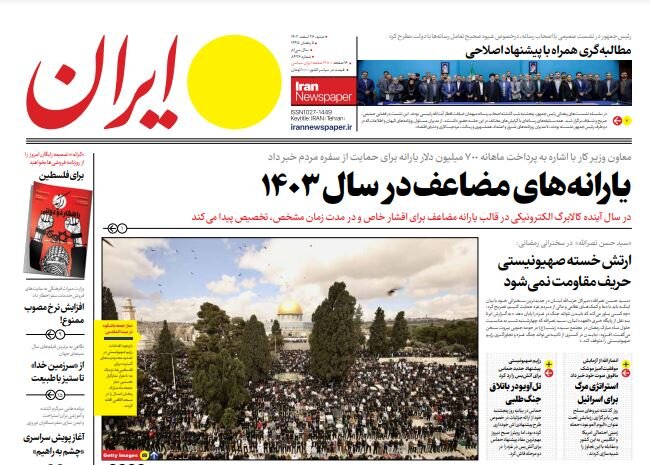Separatism in the service of sabotage

TEHRAN - In a note, the Iran newspaper addressed the plans of the enemy to divide Iran and said: The enemies of ethnic diversity in Iran, including the British government, have sought to create a crisis, divide the country, and weaken a strong Iran.
America, European countries, and the Zionist regime are seeking to activate ethnic and religious division to advance the project of "separatism" in Iran, a project that became the main goal of making Iran insecure during last year's riots. Undoubtedly, the riots that occurred in the country also followed the separatist project. According to the Leader of the Revolution, the American government has created a group in America, which is called the "Crisis Group"; the mission of this group is to create crisis in countries, including our country. They have come to the conclusion that several crises point in Iran must be stimulated and activated including ethnic differences, the issue of religious differences, the issue of gender, and the issue of women. They should be provoked in Iran to create a crisis and through crisis, they can harm our dear country. This is America's program.
Kayhan: Iran's goal is to reach an agreement
In an analysis, Kayhan addressed the West's disloyalty in regard to the JCPOA and wrote: In 2018, Trump withdrew from the JCPOA, and Biden refused to revive America's commitments despite the Democrats' criticism of Trump's work. Both Trump and Biden administrations had one feature in common: reneging on their obligations and demanding things beyond the JCPOA. Now, the Western media in Iran have a mission to cause an inflationary shock to the currency market by creating Trump-phobia. This is while they were denying Trump's threat to the nuclear deal during the JCPOA negotiations. Despite these tensions, by putting aside feelings and sensitivities and protecting the interests of the country and the people of Iran, the Iranian side should try to reach a comprehensive agreement with the Joe Biden administration on nuclear and non-nuclear issues, especially lifting basic sanctions. If Joe Biden wins, the agreement with him will continue naturally. But if Trump returns to power and he wants to cancel previous agreements, negotiations and a new agreement will follow with him.
Vatan-e-Emrooz: Iran's role in the "Golden Triangle"
In a commentary, Vatan-e-Emrooz dealt with the recent naval drills of Iran, China, and Russia in the waters of the northern Indian Ocean for the fifth year in a row. It said: By being among the 3 strategic straits, the northern Indian Ocean is known as the "Golden Triangle" in the maritime literature of the world, which is the Strait of Hormuz in its north, the Strait of Malacca in its east, and the Strait of Bab al-Mandab in its west, and a large amount of the world's maritime trade passes through it. During the past years, due to the occurrence of some instabilities in some countries of this region, the communication lines in some important and strategic seas such as the Bab al-Mandab strait, the Gulf of Aden, and the Red Sea became insecure, and the pirates also added to its dangers. In order to deal with these insecurities, many countries entered the scene, and the Islamic Republic of Iran was one of them, with the difference that most of the countries acted under a coalition led by the United States, but countries such as Iran, Russia, and China were independently present in this region, and our country was able to handle security for the commercial ships of Iran and other countries.
Hamshahri: America is looking to reduce tension against Iran
In an explanation, Hamshahri pointed out the annual meeting of the American intelligence apparatus with the lawmakers and wrote: The reports published from this meeting show that American security-intelligence decision-makers are more concerned than before about the development of cooperation in the triangle between Iran, Russia, and China; they evaluate this issue as a serious threat to the traditional structure of the international system based on Western-American unilateralism. Although Washington has used sanctions in recent years to control the increasing activities of this triangle, now it seems that trilateral relations have gained more depth and breadth. The current developments in the occupied territories have shown more than ever the failure of American policies in facing the Islamic Republic. In such a situation, although some are trying to push Washington towards a "tough conflict" with Tehran, in the current situation, the U.S. does not have enough power to achieve such a goal and is trying to reduce the level of international and regional tensions.
Leave a Comment